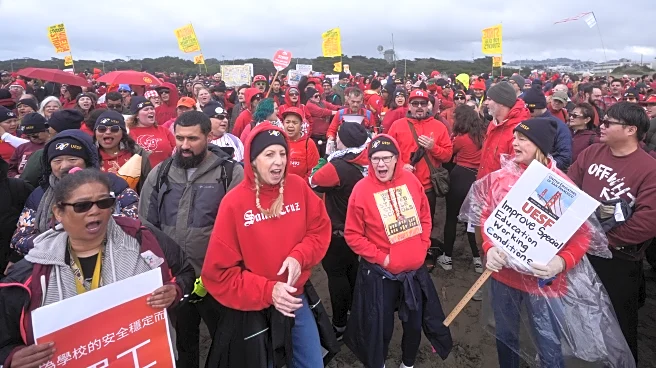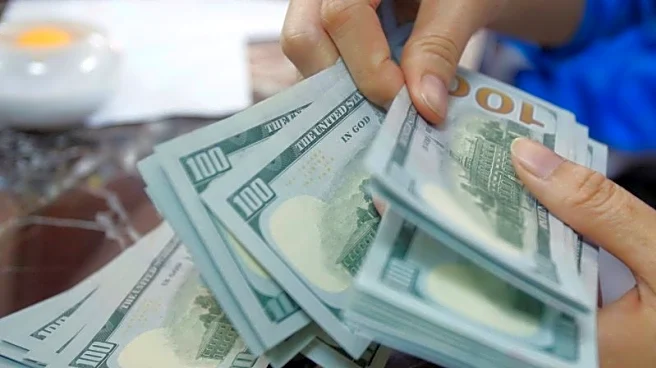By Jamie McGeever
ORLANDO, Florida (Reuters) -Wall Street succumbed to a tech-led selloff on Tuesday, slammed by warnings of a market pullback from top U.S. bank CEOs and a steep slide in AI darling Palantir, while the dollar continued its climb and Treasuries drew some safe-haven demand.
In my column today, I look at deepening splits at the Fed, and how the polarization of opinions on where rates should go poses a major test of consensus-builder and Fed Chair Jerome Powell's leadership and skills
of persuasion.
If you have more time to read, here are a few articles I recommend to help you make sense of what happened in markets today.
1. Palantir's bull run stalls as Burry bets against the AIdarling 2. Amazon's $38 billion OpenAI deal shows it is no longeran AI laggard 3. Wall Street braces for NYC mayoral vote, while governorraces give possible midterms view 4. BoE rate cut dances around political optics: Mike Dolan 5. UK's Reeves paves way for tax rises in her next budgetToday's Key Market Moves
* STOCKS: Nasdaq -2%, S&P 500 -1.2%. World stocks -1.1%,Japan -1.7%, Asia ex-Japan -1.3%. * SHARES/SECTORS: Palantir -8%, Philadelphia semiconductorindex -4%, Norwegian Cruise -15%, consumer discretionaries-1.9%. Financials +0.6%. * FX: Dollar index 3-month high above 100, sterling at7-month low $1.30. Crypto slumps: bitcoin -6% below $100,000,ether -11%. * BONDS: Treasury yields down across the curve but only2-3 bps. . * COMMODITIES/METALS: Gold -1.5%, oil -0.8%.Today's Talking Points
* U.S. government shutdown matches record
The government shutdown entered its 35th day on Tuesday, matching a record set during President Trump's first term for the longest in history. Food assistance for the poor has now been halted, federal workers across the spectrum are going unpaid, and airspace in certain parts of the country may soon be shut down.
At the macro level, the CBO estimates an eight-week shutdown will reduce Q4 annualized real GDP growth by 2 percentage points, although much of that will be recovered. Meanwhile, the Fed is flying blind owing to the economic data drought. You can see why investors might want to take some chips off the table.
* Wall Street and a democratic socialist mayor?
New York City chooses its next mayor, most likely Zohran Mamdani, a 34-year-old Muslim democratic socialist who has pledged to hike taxes on people making over $1 million a year and raise corporation tax. According to the Empire Center think tank, Mamdani's income tax hike will affect about 1% of filers, and the corporate tax hike would affect about 1,000 of the city's 250,000 businesses.
Wall Street heavyweights Bill Ackman and Dan Loeb have warned that Mamdani will be a disaster for New York. Others have warned the rich will leave the city and take their money with them. Online prediction platform Polymarket puts the probability of a Mamdani win at 95%.
* British budget blues
Tax rises in Britain are coming. In a speech on Tuesday ahead of the annual budget later this month, Chancellor Rachel Reeves warned of the "hard choices" she faces to protect public services, avoid austerity, and bring down the national debt.
One of Labour's main election pledges last year was not to raise any of the major taxes, so Reeves is in a difficult spot. Investors aren't particularly impressed, and sterling slumped - growth might suffer and the BoE may be forced to offset tighter fiscal policy with looser monetary policy.
Fed divisions threaten Powell's era of consensus
Disagreement and dissent among the Federal Reserve's 19-strong monetary policymaking committee are deepening as the fog of economic uncertainty thickens, putting Chair Jerome Powell's consensus-building skills to the ultimate test.
The Fed's decision last week to cut interest rates was unexceptional, but the meeting was historic. The 10-2 vote to cut rates by a quarter of a percentage point was only the third time since 1990 that voting Fed members dissented in favor of both tighter and looser monetary policy. Trump-appointed governor Stephen Miran voted to cut by 50 basis points, while Kansas City Fed President Jeffrey Schmid voted for no change.
These fissures were underscored by Powell in his post-meeting press conference. He told reporters that officials hold "strongly differing views about how to proceed," meaning easing in December is not the "foregone conclusion" markets had been pricing in. Indeed, December's decision may boil down to a coin-flip between another 25-basis-point rate cut or no change.
This all comes at a challenging moment. Not only are investors navigating an economic data drought caused by the U.S. government shutdown – set to become the longest on record – but the indicators that are available show both a weakening labor market and sticky inflation.
Meanwhile, the Fed is being heavily politicized, with the Trump administration attacking the central bank's independence as it also prepares to nominate Powell's successor next year.
It's a perfect storm that markets don't need, especially ones priced for perfection.
HAWKS VS DOVES
There is always going to be a wide range of views on a 19-member committee, with 12 voting members at any one time, including a mix of Fed governors and presidents of the 11 regional Fed banks.
Broadly speaking, the current division between the "doves" and the "hawks" appears loosely to have governors on one side and regional bank presidents on the other. Both sides contain centrists, but the governors are leaning in favor of easier policy, with the regional Fed presidents more apt to be cautious about further rate cuts.
Since the Fed's meeting last Wednesday, concerns about cutting rates have been voiced by Dallas Fed President Lorie Logan, Kansas City Fed President Jeffrey Schmid, Cleveland Fed President Beth Hammack and Chicago Fed President Austan Goolsbee.
Meanwhile, Governors Miran, Christopher Waller, and Michelle Bowman have publicly supported the decision to cut last week and backed further easing. Waller and Bowman are on Treasury Secretary Scott Bessent's short list to replace Powell, whose term as Chair ends in May.
'ROWDY AND DISORDERLY'
Powell's leadership and ability to pull together a consensus in this climate will be severely tested, as recent policy meetings attest. Governors Waller and Bowman dissented in favor of a rate cut in July, and then there was the historic two-way dissent last month.
It's true that non-voting regional Fed presidents are flexing their muscles, but it remains to be seen how effective that will ultimately be. As Tim Duy, chief U.S. economist at SGH Macro Advisors, points out, "the power flows from the Board".
"It's more difficult for Powell to create a consensus in this space," Duy says, adding that Powell has done a "great job" in doing just that over the years of his chairmanship.
If this policy polarization intensifies, many investors operating today will be in unfamiliar territory, having grown accustomed to well-telegraphed, consensus-driven Fed policy.
James Egelhof, chief U.S. economist at BNP Paribas, argues that the "very high level of consensus" investors are used to might prove "elusive" in the months ahead.
Egelhof still expects the Fed to deliver further rate cuts, including in December, but he also thinks we could see a "rowdy and disorderly" process leading to a "bumpier and more unpredictable" path than investors typically face.
"Polarization leads to uncertainty," he says.
Of course, greater policy uncertainty tends to fuel market volatility and increased risk aversion, which, in theory, should be reflected in rising risk premiums or widening spreads. That hasn't happened yet.
But if the emerging splits on the FOMC continue to widen, we could see just that. Don't say you weren't warned.
What could move markets tomorrow?
* UK services PMI (October) * Germany industrial orders (September) * Euro zone producer price inflation (September) * Euro zone PMIs (October, final) * ECB's Francois Villeroy de Galhau and Joachim Nagel speak * Brazil interest rate decision * U.S. ADP private sector payrolls (October) * U.S. services ISM (October) * U.S. PMIs (October, final) * U.S. earnings, including McDonald's, Qualcomm, DoorDashWant to receive Trading Day in your inbox every weekday morning? Sign up for my newsletter here.
Opinions expressed are those of the author. They do not reflect the views of Reuters News, which, under the Trust Principles, is committed to integrity, independence, and freedom from bias.
(By Jamie McGeever;)

















